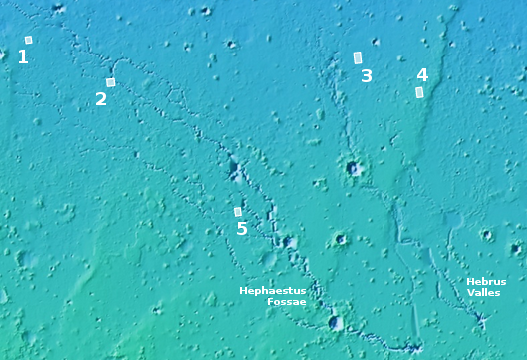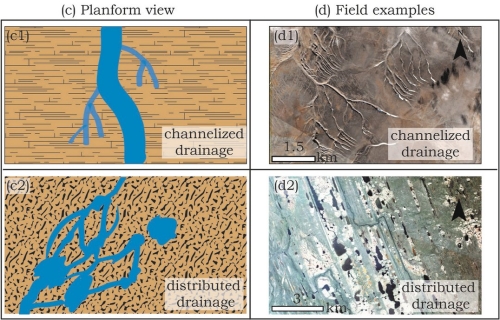New paper: Glaciers on Mars could have been extensive, despite the lack of expected subsequent landforms
According to a new paper published this week, scientists now posit that glaciation could have been much more extensive in the geological history of Mars than presently believed, despite the lack of the expected subsequent landforms as seen on Earth.
From the abstract:
The lack of evidence for large-scale glacial landscapes on Mars has led to the belief that ancient glaciations had to be frozen to the ground. Here we propose that the fingerprints of Martian wet-based glaciation should be the remnants of the ice sheet drainage system instead of landforms generally associated with terrestrial ice sheets. We use the terrestrial glacial hydrology framework to interrogate how the Martian surface gravity affects glacial hydrology, ice sliding, and glacial erosion. …[W]e compare the theoretical behavior of identical ice sheets on Mars and Earth and show that, whereas on Earth glacial drainage is predominantly inefficient, enhancing ice sliding and erosion, on Mars the lower gravity favors the formation of efficient subglacial drainage. The apparent lack of large-scale glacial fingerprints on Mars, such as drumlins or lineations, is to be expected. [emphasis mine]
In other words, on Earth the higher gravity causes glaciers and ice sheets to slide, with the liquid water at the base acting as a lubricant. On Mars, the lower gravity slows that slide, so that the water at the glacier’s base drains away instead, causing erosion and the formation of a drainage pattern in the ground beneath the glacier or ice sheet.
The image above, from figure 1 of the paper, shows on the left a graphic of the two types of drainage patterns expected, and on the right two examples found on Earth (D1: Devon Island; D2: Northwest Territories). Orbiter images of Mars have found variations of these types of drainage patterns in numerous places in Mars’ mid-latitude glacial bands, as shown below.

The overview map to the right was part of a post from May 2020, describing the pits and drainage pattern dubbed Hephaestus Fossae and Hebrus Valles found in Utopia Planitia, one of the larger northern lowland plains on Mars. The numbers mark the locations of pits.
In fact, this paper combined with the data from orbital images strongly suggest that the water at the base of the Martian high latitude ice sheets could not only have formed these surface drainage patterns, it could also caused the formation of extensive underground drainage. The pits and their association with such surface drainage strongly reinforces this supposition.
On Christmas Eve 1968 three Americans became the first humans to visit another world. What they did to celebrate was unexpected and profound, and will be remembered throughout all human history. Genesis: the Story of Apollo 8, Robert Zimmerman's classic history of humanity's first journey to another world, tells that story, and it is now available as both an ebook and an audiobook, both with a foreword by Valerie Anders and a new introduction by Robert Zimmerman.
The ebook is available everywhere for $5.99 (before discount) at amazon, or direct from my ebook publisher, ebookit. If you buy it from ebookit you don't support the big tech companies and the author gets a bigger cut much sooner.
The audiobook is also available at all these vendors, and is also free with a 30-day trial membership to Audible.
"Not simply about one mission, [Genesis] is also the history of America's quest for the moon... Zimmerman has done a masterful job of tying disparate events together into a solid account of one of America's greatest human triumphs."--San Antonio Express-News
According to a new paper published this week, scientists now posit that glaciation could have been much more extensive in the geological history of Mars than presently believed, despite the lack of the expected subsequent landforms as seen on Earth.
From the abstract:
The lack of evidence for large-scale glacial landscapes on Mars has led to the belief that ancient glaciations had to be frozen to the ground. Here we propose that the fingerprints of Martian wet-based glaciation should be the remnants of the ice sheet drainage system instead of landforms generally associated with terrestrial ice sheets. We use the terrestrial glacial hydrology framework to interrogate how the Martian surface gravity affects glacial hydrology, ice sliding, and glacial erosion. …[W]e compare the theoretical behavior of identical ice sheets on Mars and Earth and show that, whereas on Earth glacial drainage is predominantly inefficient, enhancing ice sliding and erosion, on Mars the lower gravity favors the formation of efficient subglacial drainage. The apparent lack of large-scale glacial fingerprints on Mars, such as drumlins or lineations, is to be expected. [emphasis mine]
In other words, on Earth the higher gravity causes glaciers and ice sheets to slide, with the liquid water at the base acting as a lubricant. On Mars, the lower gravity slows that slide, so that the water at the glacier’s base drains away instead, causing erosion and the formation of a drainage pattern in the ground beneath the glacier or ice sheet.
The image above, from figure 1 of the paper, shows on the left a graphic of the two types of drainage patterns expected, and on the right two examples found on Earth (D1: Devon Island; D2: Northwest Territories). Orbiter images of Mars have found variations of these types of drainage patterns in numerous places in Mars’ mid-latitude glacial bands, as shown below.

The overview map to the right was part of a post from May 2020, describing the pits and drainage pattern dubbed Hephaestus Fossae and Hebrus Valles found in Utopia Planitia, one of the larger northern lowland plains on Mars. The numbers mark the locations of pits.
In fact, this paper combined with the data from orbital images strongly suggest that the water at the base of the Martian high latitude ice sheets could not only have formed these surface drainage patterns, it could also caused the formation of extensive underground drainage. The pits and their association with such surface drainage strongly reinforces this supposition.
On Christmas Eve 1968 three Americans became the first humans to visit another world. What they did to celebrate was unexpected and profound, and will be remembered throughout all human history. Genesis: the Story of Apollo 8, Robert Zimmerman's classic history of humanity's first journey to another world, tells that story, and it is now available as both an ebook and an audiobook, both with a foreword by Valerie Anders and a new introduction by Robert Zimmerman.
The ebook is available everywhere for $5.99 (before discount) at amazon, or direct from my ebook publisher, ebookit. If you buy it from ebookit you don't support the big tech companies and the author gets a bigger cut much sooner.
The audiobook is also available at all these vendors, and is also free with a 30-day trial membership to Audible.
"Not simply about one mission, [Genesis] is also the history of America's quest for the moon... Zimmerman has done a masterful job of tying disparate events together into a solid account of one of America's greatest human triumphs."--San Antonio Express-News



Bob…. This must be getting your Splunkysenses Tingling left and right….
What do the drainage systems look like given the relatively soft seeming nature of the Martian sedimentary rocks, perhaps some of the pits we have seen are more like sinkholes seen over hydrological cave systems on earth..
Caving on Mars just got a much more interesting idea.
I wonder what, if any, minerals could be desolved and deposited in such caves… Obviously limestoneish would be perfect, but who knows what happens on this alien world.
Now I can’t get the image out of my mind of vast red caverns with huge red stalactites and stalagmites… Here’s hoping you, I, and all the readers live to at least get a small peek into this possible underworld.